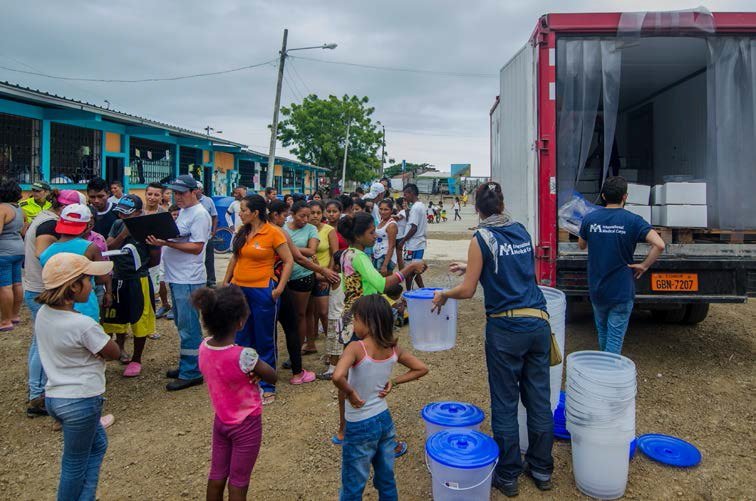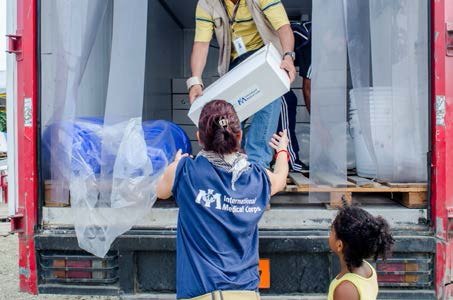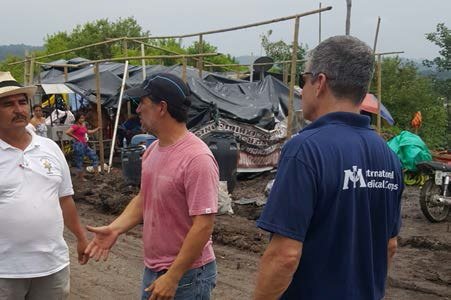By Kimberly Laney | Resource Development Officer
“We arrived in Jama next. Jama has mostly two- and three-story mixed construction of cement and wood. Nearly every building had gross evidence of damage or was collapsed… We continued on to Pedernales around 1 PM… There are many families camping right on the edge of the road.” Dr. Rob Fuller, doctor and long-time first responder, wrote these words on April 22 after traveling through Manabí Province.
The magnitude 7.8 earthquake that struck off the western coast of Ecuador destroyed approximately 7,000 buildings, the majority in Manabí. Although robust response and recovery efforts are ongoing, assistance to people in more remote communities is reportedly moving more slowly. From Jama to Pedernales in Manabí, families are establishing spontaneous settlements, and the numbers of displaced persons in camps has slightly increased in the past week.
Many of these displaced people came from rural villages with limited access to services, particularly in water and sanitation. Government and humanitarian assessments of the earthquake’s impact indicate that an estimated 720,000 people are in need of humanitarian assistance across the six affected provinces for which the Government of Ecuador declared a state of emergency.
Today, International Medical Corps’ emergency response team is on the ground in Manabí Province—one of the most affected provinces—to support relief efforts led by the Ecuadorian government. In response to the needs our emergency response team identified at official displacement sites and surrounding areas in Pedernales, we are coordinating with Ecuador’s Ministry of Economic and Social Inclusion, the Ecuadorian military, the UN Children’s Fund, and local communities to deliver water, sanitation, and hygiene assistance at both official camps and spontaneous settlements. We are planning to build accessible and private bathing facilities and provide handwashing stations at 20 to 30 displacement sites around Pedernales.
International Medical Corps—with the support of local volunteers—has distributed 250 family hygiene kits to the four official camps in Pedernales, assisting a total of 1,250 people. The kits contain bath soap, laundry soap, buckets, towels, toothpaste, toothbrushes, sanitary pads, toilet paper, and razors, to support sanitation and hygiene. We aim to distribute hygiene kits to another 1,000 earthquake-affected families across Pedernales and Jama.
To assist small vendors who sell fresh produce in camps and the spontaneous settlements, the emergency response team will provide tailored hygiene kits that include materials for washing food with safe water in order to help limit the spread of disease. In order to maximize the impact of these efforts, International Medical Corps will coordinate with the Ministry of Public Health to provide hygiene promotion campaigns that improve awareness of good hygiene and sanitation practices.
We at International Medical Corps thank you and the GlobalGiving community for your continued support as we coordinate with the Ecuadorian government, local authorities, community leaders, and other humanitarian actors to address needs assessed by our emergency response team and first responders, like Dr. Rob Fuller, and experienced by the men, women, and children affected by the quake in Ecuador.
Project reports on GlobalGiving are posted directly to globalgiving.org by Project Leaders as they are completed, generally every 3-4 months. To protect the integrity of these documents, GlobalGiving does not alter them; therefore you may find some language or formatting issues.
If you donate to this project or have donated to this project, you can receive an email when this project posts a report. You can also subscribe for reports without donating.


